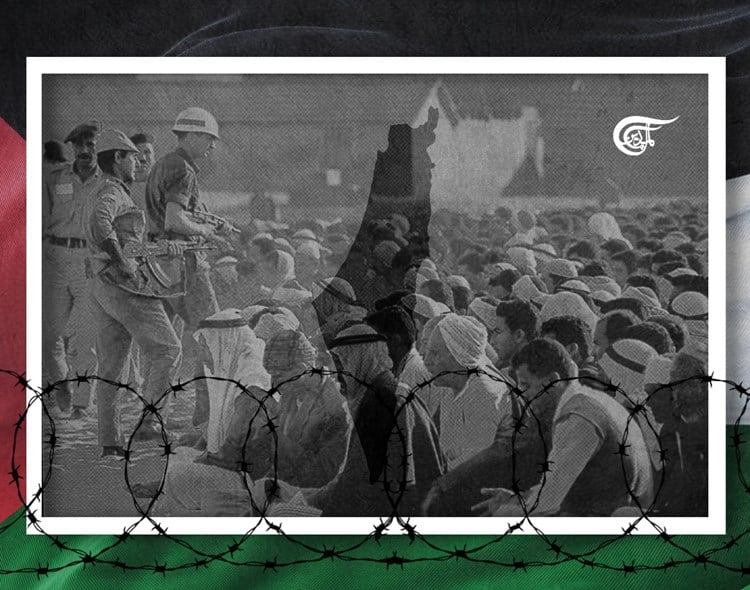Different names
On the anniversary of the Naksa, officer Mohammad Salah has served as a reminder to "Israel" that "Camp David" is not the choice of the Egyptians and will not bring it guaranteed peace and enduring security.
The Arabs prefer to call it the Naksa [setback], while the Israelis tend to refer to it as the "Six-Day War." But its various names and their symbolic implications notwithstanding, the fact remains that "Israel" managed to defeat three Arab armies in that flash war and snatch a victory that it never expected even in its wildest dreams.
Much has been said about that war in evaluations and assessments that transcend battlefield developments and their political contexts. Much ink has been spilled describing the dominant Arab regimes at that time (which, it just so happens, still endure to this day). There emerged among our intellectuals, writers, and artists who sought to revisit the value of concepts like freedom and democracy in the belief that their absence from our vocabulary was a significant factor in that humiliating defeat.
On the other side, the euphoria of the swift, low-cost victory left "Israel" giddy. Its leaders and generals climbed to the highest tree-tops, only to be awakened from their stupor by chants of Allahu Akbar from Egyptian troops as they planted their flag on the Eastern bank of the canal and from Syrian soldiers as they crossed the armistice lines in the occupied Golan Heights.
No one in "Israel" expected that the June 1967 war would be the last such flash war and that henceforth it would have to prepare itself to face a new caliber of soldiers and combatants and new, fertile forms of warfare. No one thought that it would ever again brag about measuring its wars in hours and days rather than weeks and months, or that the era of its resounding victories had passed, to be replaced by phases of tainted victories, or, say, cumulative defeats.
Not a few months had passed before the unforgettable Battle of Karameh when the Jordanian army and Palestinian Resistance fighters taught the invaders a lesson they would never forget. They thought it would be a short excursion of a few hours until the mission was accomplished, but they retreated dragging their tails behind them, leaving their scorched vehicles as evidence of the resolve and courage of Arab combatants when given the chance to go head-to-head with the enemy.
Were it not for politics and its base considerations and yet-to-be-revealed intrigues, the October 1973 war would have marked the start of a strategic shift in the balance of power. At the time, "Israel" was only saved from the Arab armies' synchronized attacks by Washington directly entering the fray and airlifting tanks fully loaded with shells directly into the war zone.
That day, Golda Meir scratched her head, grappling with the question of whether to resort to the nuclear option (literally) in Dimona. And so the euphoria of the flash victory turned into a demoralizing nightmare after a mere six years punctuated by a war of attrition and commando operations on various fronts as the Palestinian Resistance movement emerged to atone for some chapters of history.
It took "Israel" three months to reach Beirut and occupy it [in 1982], after facing fierce pushback from the Lebanese national resistance front. Lebanon registered its first victory against "Israel", forcing it to withdraw from the heartland and South under the blows of the resistance without negotiations, terms, or preconditions, and also without peace accords or normalization treaties. Then came the [2006] July War and recurring military attacks on Gaza starting in 2008, the last round being Operation Avenging the Free just a few weeks ago. And the cycle keeps churning.
56 years after the Naksa, the Israeli vocabulary, rife with vacuous arrogance, has been replaced with reports of the army's ill-preparedness, the vulnerability of the home front, and the difficulty of entering the hornet's nest in South Lebanon and South Palestine. Meanwhile, the West Bank has taken up arms on a wide scale despite Israeli operations and facing re-occupation. Now, on the anniversary of the Naksa, officer Mohammad Salah has served as a reminder to "Israel" that "Camp David" is not the choice of the Egyptians and will not bring it guaranteed peace and enduring security.
Moreover, despite the collapse of the Eastern front, "Israel" is haunted by the specter of the front beyond the Eastern front, further to the East, in Iran. This has become a source of concern and a chronic headache for the Israeli national security doctrine that is unmatched by any other threat. The security and political circles in the Israeli government and opposition alike unanimously agree on this. Just as Hezbollah replaced the Palestinian Resistance in Lebanon with a fiercer and more capable resistance after the 1982 war, so will Iran replace the Eastern front, whose defenses have been crumbling for over thirty years, but with greater strength and unmatched power.
More importantly, today "Israel" is almost suffocating from the consequences of the 1967 war. Perhaps because it was so swift and fleeting, there was no time or opportunity to get rid of the Palestinian demographic problem. If "Israel" had given due consideration to the seven million Palestinians between the [Jordan] River and the [Mediterranean] Sea, it might have decided to prolong the war and refrained from a ceasefire until the last Palestinian passed through the Rafah crossing or the King Hussein Bridge toward Jordan and Egypt... I surmise that there are those in "Israel" today who claim to have retroactive wisdom and speak in such terms.
"Israel" will discover that its occupation of part of the Palestinian land and people for over 75 years and of the other part for over half a century is a key underlying cause of its internal crises. The rise of the fascist, racist right is the fruit of the occupation, and the spread of ultra-Orthodoxy and religious nationalism is an inevitable consequence of the ongoing occupation. Likewise, the powder keg created by its side activities, the spread of exclusionary polarization in the Israeli interior, and the rise of rogue settler militias are all the logical outcomes of subjugating another people.
The Goebbelsian propaganda machine managed to portray "Israel" as an oasis of democracy in the barren Middle East desert. Its leaders and supporters sang the mantra of 'shared values' uniting "Tel Aviv" and the civilized West. The settler-colonialist entity managed to hide behind the cover of international legitimacy that it did not deserve. Its generals even had the audacity to claim that theirs was the most moral and ethical army in the world, completely disregarding the dark history of ethnic cleansing, genocide, and massacres that it has committed over time, leading to the Palestinians' expulsion and ouster from their land.
All of this is changing today. "Israel" is increasingly being labeled an "apartheid state", and the global public is holding up a mirror that reveals the ugly face of its settler-colonialist nature. "Israel", which has always boasted about its "invincible army", now stands helpless in the face of seven million Palestinians who will not budge from their historic homeland.
"Israel" managed to destroy the "two-state solution", leaving no way for the establishment of a viable Palestinian state. But it is also well aware that the notion of a single "state" of any form would spell the beginning of the end of the Zionist project. "Israel" is in a bind, and its only option is to defer posing major existential questions to a later date.
It is not only the Palestinians who are astray. The Israelis, who have experienced loss of direction before, are now tasting it again. Underneath the image of strength that "Israel" tries to project lies vulnerabilities and corrosive factors.
The more that "Israel" continues to fracture, the closer the moment of truth and reckoning approaches, until the time comes to raise existential questions.

 Oraib Al Rantawi
Oraib Al Rantawi
 8 Min Read
8 Min Read












